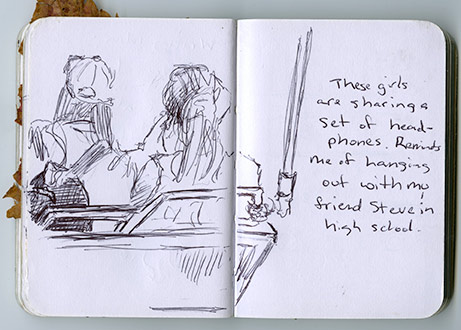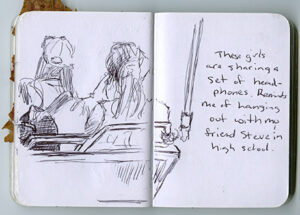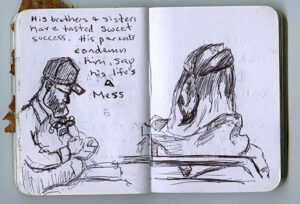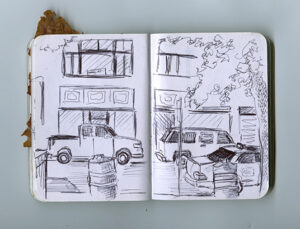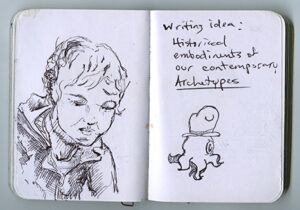This morning I was reading on the bus from Henri Dorra’s The Symbolism of Paul Gauguin, and one passage in particular struck me as interesting. In another letter to Schuffenecker, Gauguin said, “In certain almost supernatural states of the soul, the profundity of life reveals itself full in the display before one’s eyes however ordinary it might be. It becomes its symbol.” As I was reading this it dawned on me what that feeling of documenting daily life in a sketchbook really is: It is this moment of self-awareness, that this moment matters. There is something to this moment that means something to me. It is poetic and important. Working quickly in a pocket sketchbook allows this sort of snap judgement to really come alive.
I wonder, however, how one can take these visceral moments and communicate them without the aid of a camera. Would I need to draw from memory? Would I simply draw from the sketch and end up with a very loose piece? I don’t know that painting that loosely would carry the same gravity as the moment seems to encapsulate. The other night on the bus, I saw two girls splitting the earbuds from one phone playing music. It conjured memories of my days playing sports in high school, riding the bus next to my friend Steve. It seemed important to document the moment more because of the universality of it than anything else. However, if I communicate that to a final piece it will lose something that the drawing holds in documentation alone.
Later in the week I was listening to Social Distortion on headphones with a petite punk rock girl sitting several rows ahead of me. I thought back to this nature that I’ve had the majority of my life. Punk music talks to a scene. People who listen to punk rock are often considered a community. Wouldn’t it make more sense to sit next to the punk rock girl and strike up a conversation than to listen to Social D contentedly in the back of the bus. I’ve built these barriers with the music as my companion rather than breaking down the barriers using the music as my weapon. I wonder how many people do that? The moment felt important, inherent in my nature.
So many moments that I experience with my son seem like something bigger than what they actually may be. He is learning all about the world, how he interacts with it and what it is. I have the opportunity to experience everything that we see again for the first time. Explaining to another human being is experience at an all new level. We observe more and in an entirely different way than we do when we use the “I know what that is” eyes. Our familiarity with daily life kills our sense of the moment. People will often tell you to be mindful of yourself and your surroundings, but I think there is no better way to do this than to attempt to record your surroundings and yourself. These moments of observation so easily do become a symbol. You are no longer looking at one couple sharing headphones or one fellow sitting in the back of the bus, but you are now looking at BFF’s and the solitary individuals, the Saul Bellow characters walking through your daily life. Perhaps they feel more sadness or introspection, or perhaps they are more comfortable with accepting their own sadness and introspection.
Children are generally understood as new to all of these games. There is both a positive and a negative connotation to the word naive. It is perfectly acceptable for a child to be naive and deplorable for an adult to be so. And so it is interesting to partake in play listening; to purposefully allow yourself to behave in a naive fashion in order to better the development of a child’s psyche.
What is it to make artwork utilizing this voice? Is naivety an issue because adult must go to work and be grown up or because somehow it assumed that you will miss out on something more profound? I am growing to think that there is something very symbolic to the act of seeing things like a child. If a person is able to approach a situation without a Deuleuzian Rhizome of understanding, perhaps you can experience that situation or object for the first time. You can through what it is supposed to be. I think it is just a symbol of hope, but do any of us, as adults, really understand what hope could be?
Peace
-Mike
